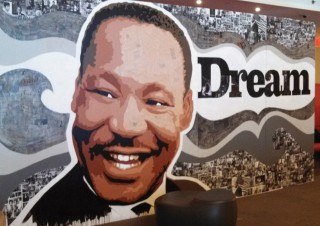Title

The Juilliard student-created King mural.
(Photo by Jessica Epps) More Photos »What is the artist's responsibility in fighting racism? This is a question I had after watching King: A Dream Revisited, Juilliard's performance and panel discussion celebrating the legacy of Martin Luther King Jr. The evening's events challenged me to ask uncomfortable questions I hadn't dared to ask before.
Body
Do white people talk about racism? Black people express the need all the time, yet we still don't talk about it nearly as much as we should. Why? Why do we still look away?
Avoidance, unfortunately, is something I know all too personally. Growing up in both Germany and the United States, I have been exposed to two countries that have a very pronounced history with regard to racism. I have seen a great deal of "white guilt," both in myself and in others. Ever since learning about the Holocaust as a young child, I have been overwhelmed with shame every time I am asked where I am from. Due to my own history, I have a lot of empathy for this kind of shame. But I also know it is not an excuse.
At its core shame is fear, and just like any type of fear, it is powerful. It convinces us that saying nothing is better than saying the wrong thing. For a long time, I thought I had to be an expert on racism to participate in the dialogue. As a result, I pushed away my responsibility and choice. To all my friends of color, I want to say that I'm sorry.
Suppose shame didn't have to be a barrier but rather an opportunity to be vulnerable and gain strength through exposure? What if we ran toward the roar of discomfort and started listening rather than defending? What could happen if we valued our friends' equality more than we feared our shame?
King: A Dream Revisited was an incredibly touching experience for me. What really moved me was its true celebration of African-American culture. Frequently, when we pursue equality, we end up trying to mold black culture into white culture, which unfortunately conveys that we don't need black culture. But practicing equality does not just mean providing equal opportunity; it also means creating equal awareness for people of all cultures and their art. Black culture is just as American as white culture and if we don't embrace it, we're incomplete as an educational institution.
We are not responsible for our ancestors' actions, but we are responsible for how we choose to react to these actions. It is our duty to challenge the ideologies that have led to our present. If we want to create a future of true equality, we must take initiative. It is the individual pursuit of self- awareness and concrete action that will move us forward. We must recognize the racist patterns within ourselves first. The biggest influence we can have on another person's life is to positively affect their self-perception, so how do we do that? How do we choose to value and celebrate every human being's true identity? How do we choose to react when someone tells us they feel devalued or unheard? Do we listen? Or do we defend?
Artists are not in a position of power in the way that politicians or social activists are. Therefore, my sense of ability relative to being an agent of change used to be almost nonexistent. But now my beliefs have been challenged. Suppose artists do actually have the biggest ability to encourage change from and within society? How do people create racist stereotypes in the first place? And how does our art support or challenge unconscious racist stereotypes in society's psyche? "Not seeing" color simply means denying the identity of minorities, so let us see color and let us celebrate it! I challenge myself and you to embrace our stories, share our narratives, and learn to lead a life of empowered service by means of our performances, our voices, and the stage on which we can capture the attention and hearts of many.










